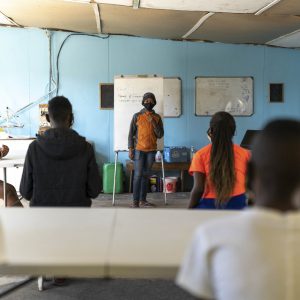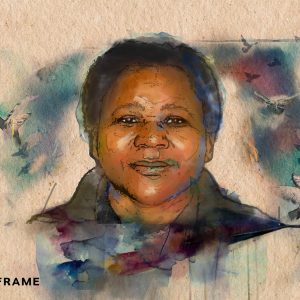Eastern Cape school’s infrastructure horror
For years, nothing has been done to improve the dire state of Inkqubela Primary, forcing parents to remove their children from what is supposed to be a safe centre of learning.
Author:
22 October 2020

As early as 7am on 24 August, concerned parents gathered at Inkqubela Primary School in Port Elizabeth to vent their frustration over its poor state and its lack of capacity to deal with Covid-19. Their voices travelled through the broken windows of the classroom they used.
For more than four years, the women of Kwazakhele township have been expressing their dissatisfaction with the state of the primary school, which has 445 pupils and 10 teachers.
Located in one of Port Elizabeth’s largest townships, with over 100 000 residents, the area suffers vast underdevelopment and its residents are deeply impoverished.
Like many quintile one public schools in the Eastern Cape, Inkqubela Primary’s infrastructure is broken. The government’s inability to provide quality services to township areas has brought such schools to their knees.
Related article:
“The toilets are blocked and the children have to use unisex toilets,” said Ntombizani Vusani, the parent of a grade 3 pupil. “All the pupils have to use a single tap. The whole fence has gone down.
“The school is not safe; some classrooms don’t have doors. One day a strange man came to one of the classrooms and removed a door in front of the teachers. The teachers are also scared. Some of them are robbed on the school ground. The entire school is filthy,” she said.
The Eastern Cape Department of Education is generally regarded as one of the worst performers in South Africa and some parents say they carry the burden of neglected schools in the province.
Unsafe environment
Last year, parents also protested after eight-year-old grade 1 pupil Anda Mani drowned in the nearby Swartkops River. He and some classmates had left the school ground through one of the broken fences. The protest was largely held over his death, but also because frustration with the rundown infrastructure had reached boiling point. Angry parents called for the removal of the principal, Frane Adams. They burned tyres on the narrow street leading to the school and called for swift intervention from the department.
“The death of that child was a rude awakening for us,” said one of the parents, Vuyokazi Dubela. “We realised that our children are not safe at this school. Nearby there are squatter camps, and due to the current government’s lack of service delivery many of those residents come to the school toilets to relieve themselves and often use the single tap available at the school. This causes a health risk to our kids.”
Related article:
The Eastern Cape treasury’s budget guide for 2020-2021 reflects an allocation of more than R1.5 billion for school infrastructure development. It is not known how much of this budget will be allocated to schools such as Inkqubela.
The president of the school governing body, Mkhululi Hewu, said: “The situation at the school is dire and as parents in the [school governing body] we are saddened by this. The state of classrooms is poor, there are broken windows and in winter, or during cold weather conditions, children are freezing and this makes them lose focus in class. We as the [school governing body] have even approached district [officials] on numerous occasions, yet nothing has been done.
“Some parents have removed their children at this school. We are worried that more parents will do the same and that might result in the closure of the school. At the beginning of this year, we even went to the provincial education department in Bhisho. The officials informed us that Inkqubela went from being 19th on the list to being first priority and that they will come and erect a fence first. But then lockdown occurred and they stated that Covid-19 had disrupted their plans to fix the school.”
On 27 August, another protest was led by the parents of pupils at Inkqubela, its school governing body and political parties. This time, a petition had been prepared for the department.

Singing struggle songs, the protesting parents occupied the parking lot at the entrance to wait for the arrival of district officials to accept their petition. Some of their demands included the renovation of the school, the installation of closed-circuit television cameras and alarm systems, the delivery of food for the school nutrition programme, and the provision of thermometers, masks and adequate learning materials.
The children are currently using damp and torn learning materials stored in an abandoned room without a door. It has a broken-down security gate and when it rains the books get wet.
Noziphi Hantana, a community activist, said: “We heard parents’ concerns about the school and decided to join them in this protest. We spoke to the principal enquiring why the school is opening yet conditions of the school are not conducive [to learning]. He informed us that he has tried his best but the Department of Education is not meeting him halfway.”
Adams, the principal, declined to comment on the issues raised, saying he had been advised by the department not to speak to the media.
Parents take charge
In July, during a press conference on the phased return of pupils to schools during the lockdown, Minister of Basic Education Angie Motsekga announced homeschooling as one of the options for parents whose main concern was their children’s safety. This led to some parents removing their children from Inkqubela and opting for home-based learning.

“We as parents and the [school governing body] have taken a decision to remove our children from this school. We will study with them at home. Every day we will come collect homework from the teachers so that our children can catch up on the curriculum,” said Vusani.
The Eastern Cape Department of Education’s community liaison officer, Viwe Madonci, referred queries to the communication and events manager, Loyiso Pulumani, who could not be reached for comment.
The history of Kwazakhele township
A research paper by Janet Cherry and Gary Prevost titled Kwazakhele after twenty years of democracy: The contradictory development of political plurism and political alienation traces the history of the township, which is often sidelined in the overview of South Africa’s struggle against apartheid.
Related article:
“In one of the biggest – but least documented – forced removals in apartheid, 45 000 people were moved over a period of three years. Most of Kwazakhele still consists of the original municipal house called ‘matchboxes houses’ as they are tiny rectangular houses… [T]here are three other kinds of housing in Kwazakhele. Matthew Goniwe village was originally built to be a single men’s quarters, barrack-type accommodation for migrant workers. Over the past two decades, the dilapidated and overcrowded barracks … have been converted into family housing.”
“Many of the older residents of Kwazakhele have a political history going back to the 1950s to the days before when liberation movements were banned. The ANC had a strong presence in Kwazakhele in the early years of the township’s existence, from 1956 to 1960 when it was banned. From the time of the 1976 uprising, the next generation of youth in Kwazakhele pursued a more militant path of resistance against apartheid oppression.”



